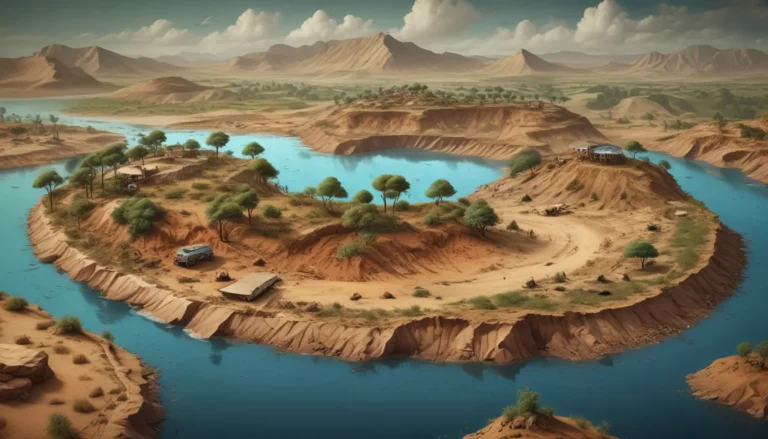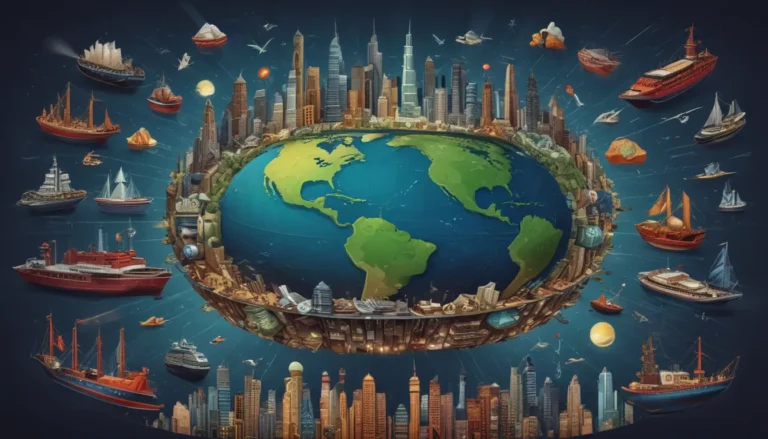A Note About Images: The images used in our articles are for illustration purposes only and may not exactly match the content. They are meant to engage readers, but the text should be relied upon for accurate information.
Resource depletion is a critical issue that impacts the current state and future of our planet. With the continuous growth of the global population and the rise in industrial development, the demand for natural resources has escalated at an unprecedented rate. Unfortunately, many of these resources are finite and non-renewable, leading to their rapid depletion. In this article, we will delve into 15 fascinating facts about resource depletion to shed light on the magnitude of this problem and the urgent need to adopt sustainable practices.
The Global Challenge of Resource Depletion
Resource depletion occurs when the demand for natural resources surpasses their rate of renewal. This phenomenon poses significant challenges for sustainable development and environmental preservation, especially with the ever-growing global population. The burning of fossil fuels, one of the primary sources of energy worldwide, contributes significantly to resource depletion. Finding alternative energy sources is crucial to reduce our reliance on finite resources such as coal, oil, and natural gas.
Environmental Impacts of Resource Depletion
Deforestation is a major contributor to resource depletion, as it destroys vital ecosystems and diminishes the Earth’s capacity to filter air, store carbon dioxide, and provide habitat for numerous species. Overfishing in our oceans is depleting marine resources due to the increasing demand for seafood. Efforts to implement effective fisheries management strategies are essential for ensuring the long-term sustainability of marine resources.
Addressing Water Scarcity and Mineral Extraction
Water scarcity has become a significant result of resource depletion, driven by rapid urbanization, population growth, and climate change. Promoting water conservation methods and sustainable water management practices is crucial in mitigating this issue. Mineral extraction for industrial purposes, such as mining for metals and rare earth elements, depletes natural reserves and can have adverse environmental impacts. Recycling and adopting circular economy principles can help reduce the need for extensive mineral extraction.
Protecting Biodiversity and Combating Climate Change
The loss of biodiversity is a consequence of resource depletion, as natural habitats are destroyed, and ecosystems are disrupted. Protecting biodiversity through the establishment of protected areas, sustainable land-use practices, and conservation efforts is vital. Climate change exacerbates the effects of resource depletion by intensifying resource depletion through greenhouse gas emissions. Addressing climate change through renewable energy adoption and energy efficiency measures can help mitigate its impact.
Ensuring Food Security and Addressing Consumer Behavior
Resource depletion threatens food security as fertile land, water, and nutrients become scarce, jeopardizing agricultural productivity. Implementing sustainable agricultural practices and promoting food waste reduction are essential to ensure food security. Consumer behavior also plays a significant role in resource depletion, with wasteful consumption patterns contributing to the issue. Embracing sustainable consumption principles and adopting eco-friendly practices can make a positive impact in reducing resource depletion.
Economic Stability and the Circular Economy Approach
Resource depletion leads to economic instability, causing price volatility and disruptions in the economy. Diversifying economies, investing in renewable energy, and promoting resource-efficient industries can help mitigate the negative economic impacts of resource depletion. The circular economy approach aims to reduce waste and continuously reuse resources, promoting resource efficiency and sustainability.
The Role of Education, International Cooperation, and Technological Innovations
Education and awareness play a key role in addressing resource depletion by fostering a collective commitment to conserving and restoring resources for future generations. International cooperation is crucial in tackling resource depletion, as it is a global issue that requires collaborative efforts between nations. Innovations in technology, such as renewable energy, sustainable agriculture, and waste management, offer promising solutions to combat resource depletion.
Conclusion: Working Towards a Sustainable Future
In conclusion, resource depletion is a significant issue that impacts our planet in various ways. It is essential to understand and address this problem through sustainable practices, renewable energy sources, and raising awareness about conservation. By making conscious choices and adopting responsible approaches towards our natural resources, we can work towards a more sustainable future. Remember, we have a responsibility to preserve and protect our planet for generations to come.
FAQs: Answering Common Questions About Resource Depletion
- What is resource depletion? Resource depletion refers to the consumption of natural resources at a rate that exceeds their replenishment, leading to scarcity or complete exhaustion.
- What are the main causes of resource depletion? Factors such as overpopulation, overexploitation, deforestation, pollution, and climate change contribute to resource depletion.
- Can resource depletion be reversed? While some resources can be restored through conservation efforts, others are finite and cannot be replenished. Sustainable practices can slow down the rate of depletion.
- What can individuals do to address resource depletion? Individuals can practice conservation in their daily lives by reducing energy and water consumption, recycling materials, and supporting sustainable businesses.
- Are there organizations dedicated to addressing resource depletion? Yes, there are numerous organizations and initiatives working towards promoting sustainable practices, conducting research, and advocating for policies that prioritize resource conservation.
By understanding the impact of resource depletion and taking proactive steps to address it, we can make a positive difference in preserving our planet for future generations. Together, let’s strive towards a world where resource depletion is a thing of the past.






